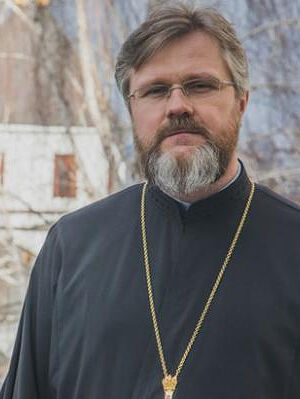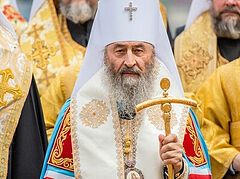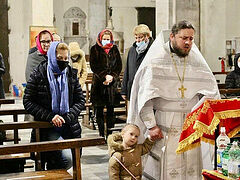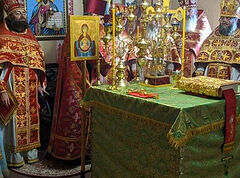Archpriest Nicholai Danilevich, Vice Chairman of the Department of External Relations for the Ukrainian Orthodox Church and rector of the Kiev Church of St. Spyridon of Trymethous, talks about events that were particularly significant for the Ukrainian Orthodox Church in the past year, and what efforts should primarily be made in the current year.
 Archpriest Nicholai Danilevich The main challenge of the past year for the Ukrainian Orthodox Church, just as for all the Churches, was the coronavirus pandemic, which paralyzed outward church life in many respects. Therefore, there were not actually many significant events in 2020.
Archpriest Nicholai Danilevich The main challenge of the past year for the Ukrainian Orthodox Church, just as for all the Churches, was the coronavirus pandemic, which paralyzed outward church life in many respects. Therefore, there were not actually many significant events in 2020.
In my view, the main event in the internal life of the UOC was the process of restoring those parishes that suffered during the crisis years of 2018–2019. In 2020, many communities of the UOC built new churches to replace those that had been seized by the schismatics. Almost every week we read news about how various localities were collecting building funds, laying foundations for future churches, raising them up for all to see, and then consecrating them. And in my opinion, these were the most important events in the internal life of our Church in 2020.
According to my observations, the most peaceful times in the life of our nation are the times when the UOC grows and develops. But the periods of turbulence, socio-political turmoil, revolution and “maidans”1—those were the times when the OCU took shape.2 Therefore, if it will be peaceful in the Ukraine, if the government will hold to a balanced policy in the sphere of religion, then the UOC will grow and develop. But if there are again upheavals, then that will be the time for the “OCU”.
One very unpleasant surprise for the UOC was the recognition of the “OCU” by Archbishop Chrysostom II and part of the Synod of the Church of Cyprus. But what is important is that this did not influence the internal life of the UOC. That is, the partial recognition of our schismatics by the Church of Cyprus did not change anything in the interdenominational situation in Ukraine. After all, not a single parish left us for schism after this—that is, as a result of this. From this we can conclude that any recognition of the “OCU” by other Local Churches, which could potentially happen, do not affect the internal life of our Church. People have discerned for themselves long ago where truth is, and where a lie is. Those people faithful to the UOC have truly remained in it. And from the strategic perspective, any recognition of the “OCU” from other Local Churches will not help that “Church”. After all, the main and most important thing for the “OCU” is that we, the UOC, would recognize them as the true and historically existing Church in Ukraine. Why? Because we live next to each other, in the same country. But any recognition beyond our borders gives the “OCU” nothing; for what good is recognition that is external and far away? Thus, in that respect they’ve gained nothing. They left us, and they must return to us. That is an ecclesiastical principle. Schismatics have to return to the Church they abandoned, and not create a new one.
The external life of the UOC in 2020 was marked by intensive communication with the Serbian Orthodox Church. Our Primate His Beatitude Metropolitan Onuphry of Kiev and All Ukraine visited Montenegro. A UOC delegation headed by Bishop Victor (Kotsaboi) also visited Serbia and Montenegro. Ukrainian Orthodox hierarchs participated in the funeral of Metropolitan Amphilohije of Montenegro and of Serbian Patriarch Irenej. In a certain sense, we have rediscovered our Orthodox brothers in the Balkans and grown closer to them. This probably happened because the Serbian and Ukrainian Churches are now facing challenges that are similar in many ways.
 Illustration from a children’s Bible for the Book of Nemiah. In February of 2020, in the Kiev Caves Lavra, an international conference was held entitled, “The Church of the Martyrs: Persecutions against the Faith and the Church in the Twentieth Century”. This was, without a doubt, one of the most important events in the theological and academic life of the UOC. And it was very good that we were able to conduct such a meaningful and reputable forum, because a large part of the UOC’s energy is now directed towards a defense of the Church from various attacks from the outside. But here we are seeing the growth of academic activity, theological thought, the recognition of the relevance of the history of persecution in soviet times, the memory of the New Martyrs and Confessors. It is important that such conferences should take place on a regular basis in order to remind us of these times and saints so very close to us.
Illustration from a children’s Bible for the Book of Nemiah. In February of 2020, in the Kiev Caves Lavra, an international conference was held entitled, “The Church of the Martyrs: Persecutions against the Faith and the Church in the Twentieth Century”. This was, without a doubt, one of the most important events in the theological and academic life of the UOC. And it was very good that we were able to conduct such a meaningful and reputable forum, because a large part of the UOC’s energy is now directed towards a defense of the Church from various attacks from the outside. But here we are seeing the growth of academic activity, theological thought, the recognition of the relevance of the history of persecution in soviet times, the memory of the New Martyrs and Confessors. It is important that such conferences should take place on a regular basis in order to remind us of these times and saints so very close to us.
In summing up 2020 and looking forward with hope to 2021, I consider that we should build our Church life in the Ukraine upon the principle laid out in the biblical Book of Nehemiah. There we read about the times when the Jews had left their Babylonian captivity and begun building the walls of their capital city as well as the Jerusalem temple. They worked with a building tool in one hand and a sword in the other, fighting off tribes that wanted to obstruct this work by their attacks. In other words, they not only defended themselves, but also built.
Therefore, in my view, our Church should likewise not just defend itself but also build. In the children’s Bible there is an illustration for the Book of Nehemiah. There are depicted three men building, with one standing guard. This strikes me as symbolic. The UOC should likewise direct a minimum of three fourths (although more would be better) towards the development, the construction of the Church’s spiritual walls, for the work of the ministry, for the edifying of the body of Christ (Eph. 4:12) and only one fourth to its defense. We can’t live in a state of constant war and continual battle in our own defense. We also have to build—even in times of war. We must build the walls of the spiritual Ukrainian Jerusalem in peoples’ hearts. The greater part of our efforts should be aimed at spiritual life, pastoral work, organizing conferences supporting and developing external relations, and missionary-enlightenment activities.
I would like very much that the example of the constructive activity of Nehemiah in times of crisis for the Israelite nation would become a certain image for us in the growth and development of our modern Ukrainian church life.



